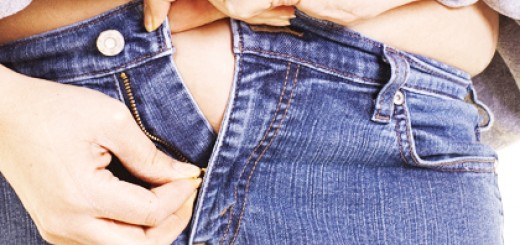 There are 8 symptoms that are typical for food addicts (or having an “unhealthy relationship with food” if you prefer that).
There are 8 symptoms that are typical for food addicts (or having an “unhealthy relationship with food” if you prefer that).
Last week I ran a survey and asked about each of them.
An e-mail went out to a total of 17.094 individuals and 875 of them answered.
Here is a description of each symptom, along with the results from the survey.
1. Cravings Despite Being Full
It is not uncommon to get cravings, even after eating a fulfilling, nutritious meal.
For example… you’ve just downed a nice meal with steak, potatoes and veggies… then find yourself craving some ice cream for dessert.
You see, cravings and hunger aren’t the same thing. You don’t feel “hungry” … because you just finished a healthy and nutritious meal, but yet there is an urge somewhere in your brain to eat something else.
This is pretty common and doesn’t necessarily mean that you have a problem. Most people get cravings.
But if this happens often and you have real problems controlling yourself, then it may be an indicator of something unnatural going on.
This craving is not about your need for energy or nutrients, it is your brain calling for something that releases dopamine in the reward system of the brain.
This is obviously very common, below 13% rarely or never experience this.
2. Eat Much More Than You Intended to
What harm is there in having a small slice of chocolate cake?
A little bit ain’t gonna kill you… everything is good in moderation, right?
These are two remarks that we get to hear quite often when we refuse an offering of unhealthy food for one reason or another.
Both of them are valid. One slice isn’t going to do us much harm and if we can eat cake in moderation then it’s probably okay.
But… for some people, there is NO such thing as a bite of chocolate or a single piece of cake. One bite turns into 20 and one slice of cake turns into half a cake.
This is an “all or nothing” phenomenon that is common with addicts of all sorts. There is no such thing as “moderation” – it simply does not work.
Telling a food addict to eat junk food in moderation is kind of like telling an alcoholic to drink beer in moderation… it’s just not possible.
When giving in to a craving, over 54% eat more than they intended to either frequently or all the time.
3. Eat Until Feeling Excessively “Stuffed”
Let’s say you’ve given into a craving…
Now you start eating, bite after bite, until you feel full (that is, if you weren’t already full when you started… see symptom #1).
But… it doesn’t stop there.
You keep on eating, then you eat some more. When you finally stop, when your “urge” is satisfied, you realize that you have eaten so much that you feel completely stuffed.
Over 36% eat until feeling excessively stuffed, either frequently or all the time. In some cases, this may be classified as binge eating.
4. Feel Guilty Afterwards, But do it Again Soon
When we do something that we know isn’t “right” – against our values, our principles or decisions we had made in good faith, we often feel bad about it.
This is called “having a guilty conscience” and is common among us human folks. It’s a feeling that is both good and bad.
Good, because it means that we do give a crap. Bad, because it just feels so damn nasty when it happens. It’s a horrible feeling.
For us who are overweight and have been trying to exert “willpower” and control our consumption of unhealthy foods, giving in to a craving can lead to a guilty conscience.
We may feel that we are doing something wrong, cheating on ourselves. We may feel weak and undisciplined.
Yet… we repeat the whole thing over and over again.
This is apparently very common, only 19% never or rarely repeatedly eat foods that they feel guilty about.
5. Making up Excuses in Your Head
When you have decided to abstain from junk food on a particular day but a craving shows up anyway, you can imagine two forces being at play in your mind.
One of them is the logical, rational decision you had made to abstain from junk food. Perhaps you decided to only cheat on Saturdays.
But the other force is the craving… today is a Wednesday and you feel like having something sweet in the afternoon.
Right now you have an urge to have a piece of food that you had previously decided you weren’t going to eat on this particular day.
The logical decision you made to abstain becomes “challenged” by the new idea… that you should indulge today and eat whatever it is that you are craving.
At these moments, you start “thinking” about whether you should or should not indulge. You may come up with some excuse about why it would be a good idea to give in to the craving and have that piece of food.
This appears to be very common. 30% do it frequently or all the time, almost 40% can relate to doing it sometimes.
6. Repeated Failures at Setting Rules For Yourself
When people are struggling with self-control in one way or another, they often try to set rules for themselves.
For example… only sleep in on the weekends, always do homework right after school, never drink coffee after 2 pm. Sound familiar?
For most people, myself included, these rules almost always fail.
There are few thing that are as hopeless as setting rules about eating, especially for those who have problems with cravings.
One cheat meal per week… two cheat meals per week… one cheat day, Saturday, where all bets are off… only eat junk food at parties, birthdays and holidays?
I’ve personally tried all of these rules, along with a dozen others.
They failed, every time.
80% of people have at least some history of failures to set rules about their food consumption. 49% answered frequently or all the time.
7. Hiding Your Consumption From Others
People with a history of rule setting and repeated failures often start hiding their consumption of junk food from others.
They may prefer to eat alone, when no one else is at home, alone in the car or late at night after everyone else has gone to bed.
I used to drive to the store, buy junk food and eat it alone in the car. If I was home alone, I would eat it there… but I made sure to throw away and hide the packaging so that no one would be able to see what I had done.
I felt ashamed of it and I didn’t like the idea of my loved ones realizing how weak I was and what I was doing to myself.
Apparently this is fairly common. 26% of people do it frequently or all the time and almost 25% of people do it sometimes.
8. Unable to Quit Despite Physical Problems
There is no doubt that the foods we eat do have a significant effect on our health.
In the short term, junk food can lead to weight gain, acne, bad breath, fatigue, poor dental health among other common problems.
But in the long term, after years and years of continued abuse to our bodies, things can start to go really wrong.
A lifetime of junk food consumption can lead to obesity, type II diabetes, heart disease, Alzheimer’s, dementia and even some types of cancer.
Someone who experiences any of these physical problems and knows that they are directly related to their consumption of unhealthy foods, but is still unable to change their habits, is in serious trouble.
Of the 870 individuals who answered this question, 54% (476 people) answered with Agree or Strongly Agree.
If anything, this question here is the most important.
Many people out there KNOW that the junk foods are harming them, but are stillunable to control their consumption.
Some More Details on The Survey
Most of the participants were female:
However, I checked and the pattern was very similar for males and females.
The age of participants:
I’d like to point out that most of those who participated were looking for weight loss information when they signed up to the mailing list.
This means that the sample may not be quite representative of the general population.
I did not use the word addiction in the survey, but mentioned that the survey was about people’s relationship with food.
If you’re interested, you can download the data here (pdf).
Are You Addicted to Junk Food?

The DSM-IV is a guide used by health professionals to diagnose mental disorders.
If you look at the criteria for substance dependence, you can easily see that many of the 8 symptoms above fit in with medical definitions of addiction.
If you are wondering whether you have a problem with food addiction or not, then you only need to ask yourself this one question:
Have you repeatedly tried to quit eating or cutting back on your consumption of junk food, but you can’t?
If you can relate to that, then sure thing – you do have a problem and you better do something about it.
Whether you are a full-blown “addict” that fits in with medical definitions of addiction doesn’t matter in my opinion.
The key point here is that deep in your heart you want to quit, but you can’t.
Original Article by: Kris Gunnars at AuthorityNutrition















